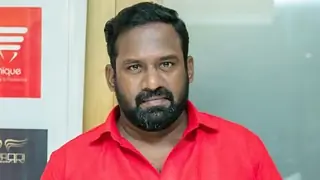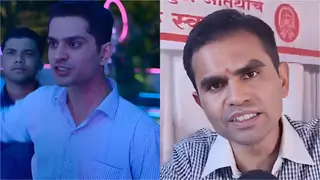Originally posted by: sania 2
ohh so now u want to break off the frndly relationship between pakistan n india?
wheneva something happens in india they lay the blame on pakistan n viseversa widout any proper reason. do u ppl want more n much much more people to die due to the bad relations n then maybe the third war between pakistan n india? 😕
i also condemn these blasts from the core of my heart but if u ppl will again start involving pakistan in these attacks so the results will be bitter.
hey sania,this is a link that Solidsnake had posted in another thread..read this and then leave your two cents😛...the article is a clear evidence that implicates Pakistan in the helping out the militants..and tell me honestly,do you expect us Indians to trust Pakistani government after knowing their key involvement in the attacks of the past...Mind you,I HAVE NOTHING AGAINST THE COMMON PAKISTANI PEOPLE,as they too are just citizens of a country like how we are the citizens of India....But the Pakistani government HAS to stop with its nefarious deeds😡( and why would it..afterall there arent any blasts in pakistan...or atleast the number of blasts are really so less or practically zero...so why would they lead a helping hand to India to extirpate terrorism)..Till sometime back,Pakistan had the USA,whenever INDIA spoke about the Kashmir issue,it fell on deaf ears😭..but when the US was attacked,it beefed up its security and began to condemn terrorism
http://www.time.com/time/asia/magazine/2001/0205/kashmir_sb1 .html
http://www.rand.org/commentary/090101JIR.html
Inside Jihad
The militants fighting Pakistan's covert war with India train in spartan camps where they are schooled for battle and prepared for martyrdom
By GHULAM HASNAIN Islamabad and Muzaffarabad
ALSO
In the Line of Fire
After decades of conflict, thousands of sons murdered and a long-standing drought of hope in the disputed region, India and Pakistan are starting a hesitant peace process
Essay: Remembering one of the "disappeared"
Four bearded militants warm themselves at a gas heater in an Islamabad safe house. A wireless set suddenly crackles. "Our boys have entered Srinagar Airport," a grave, distant-sounding voice announces. "Pray for them. It has now been 15 minutes." The voice, speaking in Urdu and broadcasting from deep within India's part of Kashmir, is detailing the progress of a suicide mission by Lashkar-i-Taiba, a ruthless, Pakistan-based militant group waging war to wrest Kashmir from India. The four men in the safe house, also members of Lashkar-i-Taiba, immediately go into fervent prayer. They are not the only ones to receive the radio transmission. Other militant groups in Pakistan can tune into the same frequency. So can the Pakistani military. A phone in the house rings, and one of the militants answers. He is asked what's happening. His reply: "Why don't you find out from your side?" After hanging up, he explains the caller was a Pakistani army colonel.
That scene occurred in early January. Five Lashkar operatives disguised as police officers attempted to attack the Srinagar airport that day. But Indian army guards turned them away, and the operation was aborted. Two weeks ago, however, a second attempt succeeded. Six would-be martyrs, dressed in police uniforms and driving a stolen government jeep, reached the outer defense gate of the airport and indiscriminately tossed grenades and opened fire with rifles. Back in the Islamabad safe house, a coded message came through at 2:15 p.m. saying the men had reached their target. Abu Ammar, a 30-year-old Pakistani veteran of the Afghan war—his face is scarred from shrapnel and his right hand is mangled—knelt and touched his forehead to the floor in prayer. "I have learned that whenever you succeed in your mission, just bow down, thank God and hail his greatness," he said. After a three-hour gun battle at the airport's perimeter, all six of Abu Ammar's men were dead, along with four policemen. (Two civilians were killed and 12 injured.)
Since Kashmir erupted in 1989, India has pointed a blunt and unwavering finger at Pakistan, accusing its neighbor of fomenting the entire problem. It's a large and cynical exaggeration: anti-Indian sentiment runs high within Kashmir, and in the first half of the 1990s, Kashmiris themselves provided the steam in the anti-Indian militant movement. They were disorganized and willing to murder, but passionate and anxious to plead their nationalist cause with the outside world.
Today, however, India's charge rings a lot truer. Despite a decade of denials—Islamabad insists it provides only moral and political support, not training or tangible aid—Pakistan is fueling militant activity in Kashmir. Of the five main militant groups operating in Kashmir, four are based in Pakistan, where open recruiting and fundraising are commonplace. Training of militants is also done on Pakistani soil. The Pakistani military is deeply involved, especially in the smuggling of anti-Indian militants across the Line of Control.
Militant groups have roots all over Pakistan, from their well-equipped training centres in Muzaffarabad—the capital of Pakistan's slice of Kashmir—and the country's North-West Frontier province to the nice, middle-class houses in Lahore and Islamabad. Those houses may look no different from their neighbors at first glance, but what about the strange antennas on the roofs, the international phone lines and the transient occupants with unkempt hair, camouflage jackets and hiking boots? And what of those unmarked four-wheel-drive vehicles pulling up at dawn with clockwork precision? Here is an inside look at how Pakistan runs its covert war in Kashmir:
Recruiting and Training
There are thousands of young, motivated Pakistani men anxious to join the militancy in Kashmir, which they consider a holy war. They come from all walks of life: not merely from the religious schools known as madrassahs, or the far-flung, poverty-mired towns and villages, but also from Pakistan's educated and Westernized middle and upper classes. In the jihad they find brotherhood, a sense of mission and purpose. And for these highly religious volunteers, many of whom are still in their teens, there is nothing more sacred in life than achieving the status of a martyr. These are the grunts in the war. The leaders are Pakistani veterans of the Afghan war.
The largest training camp in Pakistan is run by Lashkar-i-Taiba, a wing of an Afghan mujahedin group known as Markaz Al Dawa Wal Irshad. It is set on a vast mountain clearing overlooking Muzaffarabad. (Training grounds for the other three militant groups are located in the North-West Frontier province.) Armed men guard the facility round-the-clock. There are only two structures, one an armory, the other a kitchen. Trainees live and sleep in the open, whether in the sweltering summer or the depth of winter. The field is dotted with installations used to teach the fervent young—some no older than 14—how to cross a river, climb a mountain or ambush a military convoy.
The day of a trainee begins at four in the morning. After offering prayers, the militants go for exercises. A breakfast of tea and bread is at eight, followed by a full day of rigorous drills, which are interrupted only for prayers and a simple lunch, usually rice and lentils. Coursework covers how to use sidearms, sniper rifles, grenades, rocket launchers and wireless radio sets, as well as the art of constructing bombs. The teachers are Lashkar veterans of action in Kashmir and Afghanistan. Sports, music and television are forbidden. Trainees are only allowed to read pre-screened newspaper articles.
Training is divided into two stages. The first three-week session gives religious education and basic knowledge of how to handle firearms. Once a volunteer has passed that course, which costs the organization about $330 per trainee, he is sent to a designated city or town, often near his birthplace, to work at the group's offices and become more involved with the organization.
When a volunteer proves himself capable, motivated and loyal, he is enrolled in a special three-month commando boot camp, which costs the group $1,700 per student. (The money is raised from overseas groups and the Pakistani public, often via open demonstrations in Pakistani cities of militants working out, scaling walls and showing other martial tricks. Generous donors are invited to visit the not-so-secret camps to see how their money is spent.) Phase two is designed to push each volunteer to his physical limit and cull the weak from the strong. In the final weeks, recruits use live ammunition, construct actual explosives and perfect ambush techniques. The final exam lasts three days. A group of trainees, sometimes as large as 100 individuals, hikes and climbs through high-altitude, wooded terrain for three days without food or sleep. They are not allowed to slow their pace except for a few naps. At the end the hungry and thirsty survivors are given a goat, a knife and a matchbox. That's their reward, and they have to cook and eat it in warlike conditions.
Going In
Only the fittest from each graduating group are given a chance at martyrdom across the border in Kashmir. The local commander makes his choice, and the fortunate few are dispatched to safe houses along the Line of Control known as "launching pads." (Parents' permission is technically required for anyone who opts for jihad. Many boys get it easily, but some who don't, fully submerged in the dream of martyrdom, pressure their parents into complying.) At the launching pad, while waiting for their marching orders, the boys write wills and what might be their last words to their families.
At this point, the Pakistani army plays a crucial role helping to arrange the infiltration of the militants across the Line of Control. Militants officially deny Pakistani army involvement, but those who fought in Kashmir tell Time that the wait at the launching pad is dictated by their leaders, who are in touch with the army. "Until an unmarked vehicle turns up at your safe house," says a veteran of Al-Badr, the first Pakistan-based militant organization to get members across the line, "you don't know when your number will come."
When it does, this is what happens: "The vehicle, covered from all sides, will pick up two, three or four militants according to the plan and dump them at one of the forward posts of the Pakistani army," the Al-Badr veteran says. "People in civvies give us arms, ammunition, food and money [Indian currency]. We are asked to check our weapons. After a day or two they give us the signal to go ahead." None of the boys is allowed to carry his own arms to the Line of Control, although sometimes an individual can choose a favorite AK-47 and find it waiting for him at the army camp along the line.
The next step is the most hazardous: from the Pakistani army post, the group embarks on a three-to-seven night journey into Indian-controlled Kashmir, traveling by night, hiding during the day. The group leader wears night-vision goggles. The rest follow blindly across the mountains. There are numerous obstacles: Indian mines, tracer flares, Indian border patrols anxious to shoot at them. "But whenever such a situation arises," says a Lashkar militant, "the Pakistani guns come to our rescue to provide cover."
Militants making the return trip go through a reverse route, ending up at a Pakistani army base—sometimes with souvenirs. Abu Haibatullah, 32, was sent across the Line of Control in the mid '90s with a particular mission: to bring back an Indian soldier for interrogation. He managed to ambush and disarm a soldier, but when the Indian tried to snatch Haibatullah's gun, he killed him. He then decided to return home with the soldier's head. "Lots of people came to see the head," he recalls proudly. "Some were from the Pakistani army and they praised me for my gallantry."
In the 1990s, the Pakistani militants hired local guides—ethnic Kashmiris—to help them get across the mountains and into India. "On a number of occasions," says Zakiur Rehman Lakhvi, 42, the supreme commander of the Lashkar-i-Taiba militants, "they took the money and tipped off the Indians. So we trained our own manpower." In other words, the Pakistani militants don't always trust the Kashmiris on whose behalf they are waging this war. The Pakistani militancy, which had its roots in the Afghan war, is now an institution unto itself.
Pakistan's Role in the Kashmir Insurgency
By Peter Chalk This opinion article appeared in Jane's Intelligence Review on September 1, 2001 and is reproduced with permission from Jane's Information Group.
Peter Chalk investigates the extent of Pakistan's support for groups in Kashmir and how this assistance has impacted on the course and development of the conflict.
Over the past two years, increased attention has focused on Pakistan as a significant force behind the growth of Islamic radicalism and extremism in Kashmir. The US State Department's most recent report on Patterns of Global Terrorism, released in April 2001, specifically identifies Islamabad as the chief sponsor of militant groups fighting in the disputed Indo-Pakistani region. The same conclusion was reached in an earlier report by the National Commission on Terrorism and reflects current thinking in most US and Western policy-making and intelligence circles. Reasons for Pakistani backing There are currently five main groups fighting in Kashmir, all of which benefit from Pakistani support: - Hizb-ul-Mujahideen (HM); - Laskhar-e-Tayyiba (LeT); - al Badr; - Jaish-e-Mohammad (JeM); and - Harakat-ul-Mujahideen (HuM). Islamabad's backing for these groups revolves around the perennial conflict with India - a militarily, economically and demographically superior state viewed as posing a fundamental threat to Pakistan's long-term viability and integrity. Sponsoring militancy in Kashmir is regarded as a relatively cheap and effective way of offsetting existing power symmetries (essentially through the philosophy of a 'war of a thousand cuts') while simultaneously creating a bulwark of instability along the country's vulnerable southern flank. Both are considered vital to ensuring that Pakistan has sufficient strategic depth to undertake a protracted conventional war on the sub-continent, should this ever become necessary. Religious imperatives also come into play, particularly on the part of the Inter-Services Intelligence (ISI) Directorate, which enjoys a high degree of autonomy and executive space within Pakistan. The agency has specifically sought to replicate and transplant the success of the anti-Soviet Afghan campaign in Kashmir, exhorting foreign militants to participate in the conflict as part of the wider moral duty owed to the jihad. The medium to long-term aim, according to intelligence sources in New Delhi and Srinagar, is to trigger a generalised Islamic revolution across the northeast and eventually India as a whole. The nature of the support Pakistani assistance to Kashmiri insurgents covers the ambit of training, logistical, financial and doctrinal support. At least 91 insurgent training camps have been identified in Pakistan-Occupied Kashmir (POK), the bulk of which lie contiguous to the Indian districts of Kupwara, Baramulla, Poonch, Rajauri and Jammu. Basic courses run for between three and four months, focusing on weapons handling, demolitions and urban sabotage. Training for the more able recruits lasts somewhat longer and typically emphasises additional, specialised skills in areas such as heavy arms, reconnaissance and sniper assaults. Responsibility for managing these courses falls to the ISI's Operations Branch and tends to be conducted through two sub-divisions: Joint Intelligence Miscellaneous (JIM) and Joint Intelligence North (JIN). Islamist-oriented military officers are also believed to periodically 'moonlight' from their regular duties to supplement ISI instructors and help provide critical training in the fundamentals of guerrilla/jungle warfare and escape and evasion techniques. Most of the camps are located near major military establishments (within 1-15km), which Indian intelligence maintains provide the bulk of military-related resources, including light weapons (assault rifles, carbines, pistols, machine guns, rocket-propelled grenades/boosters), ammunition, explosives, binoculars and night vision devices, communications equipment and uniforms. Financing the militants Apart from military backing, Pakistan plays an important role in financing Kashmiri insurgents. According to India's Research and Analysis Wing (RAW), annual ISI expenditure to the main militant organisations runs to between US$125 and $250 million a year. These funds are used to cover salaries for fighters (which run from 5,000 to 10,000 rupees a month), support to next of kin, cash incentives for high-risk operations and retainers for guides, porters and informers. In addition, the ISI helps to fund militant proxies through the circulation of counterfeit currency and by laundering profits derived from the heroin trade. The agency also handles foreign contributions and donations (most of which come from Saudi Arabia), funnelling these to Pakistani bank accounts that are opened under the auspices of insurgent political, religious or charitable fronts. Many of these payments are co-ordinated through Rahimyar Khan, a small town in the deserts of southern Punjab where every year thousands of wealthy Arabs come to hunt the region's wildlife. Ideological indoctrination Besides acting as a major source of military and financial assistance, Pakistan remains a pivotal centre of ideological indoctrination for the Kashmiri conflict, much of which is co-ordinated through the country's burgeoning network of theological madrasahs. Many of these schools equate the concept of the jihad - which most Islamic scholars interpret as 'striving for justice' - with guerrilla warfare and explicitly exhort their students to fulfil their 'spiritual obligations' by fighting in the name of the pan-Islamic cause. The total number of existing madrasahs including satellite institutions in Pakistan is estimated at between 40,000 and 50,000. Of these, only about 4,350 are currently registered with the government. The most prominent extremist-oriented schools include the Dar-ul-Uloom Haqani at Akora Khattak; the Markaz-ad-Da'awa-wal-Irshad at Murdike; the Dar-ul-Loom at Pashtoonabad; the Dar ul-Iftah-ul-Irshad at Nazimabad; and the Ahle-Sunnat-wal Jammat at Rawalpindi. All of these madrasahs are associated with the most extreme sections of the Pakistani politico-religious lobby, such as the Jamiat e Ulema Islam (JUI), and retain close links with openly terroristic organisations. The Markaz-ad-Da'awa-wal-Irshad madrasah, for instance, constitutes the main recruiting base for the LeT, one of the most violent and feared groups presently fighting in Kashmir. Pakistan's impact Pakistan has fundamentally altered the dimensions of the conflict in Kashmir. On one level, the provision of arms, training and finance has dramatically heightened the firepower and overall proficiency of the militants on the ground. This has been reflected by: - the range and type of operations now carried out which include everything from improvised explosive attacks to suicide car bombings and full frontal assaults; - the quantity of military hardware available to the insurgents; in 2000 alone Indian authorities recovered 482 AK47 assault rifles, 53 rocket-propelled grenades (RPGs), 16 sniper rifles, 59 rocket launchers, 4,807 hand grenades, 292 anti-personnel mines, 555 rockets, 1,508kg of RDX explosive, 460 wireless sets and 20 night-vision binoculars; and - the number of militant-inflicted casualties, which increased from an annual average of 608 deaths during the first five years of the insurgency to over 760 fatalities a year between 1996 and 2000. More intrinsically, the nature of the Kashmir conflict has been transformed from what was originally a secular, locally- based struggle (conducted via the Jammu Kashmir Liberation Front - JKLF) to one that is now largely carried out by foreign militants and rationalised in pan-Islamic religious terms. With the exception of HM, all of the main organisations currently active in Kashmir are non-indigenous, composed mostly of Punjabi mercenaries from Pakistan. Indicative of this were the 1,102 foreign insurgents killed in Kashmir between 1998 and the end of January 2001 - 63% more than those slain in the eight years from 1990 to 1997. Most of those who come to fight define their objectives in both local and global terms, with the rhetorical enemy specified as any state perceived to be anti-Islamic. A case in point is the LeT, whose annual diary specifically asserts its intention to bring the jihad to the USA, Israel, Russia, the UK and France, announcing plans to 'plant Islamic flags in Delhi, Tel Aviv, Washington, Paris and London'. Risks for Pakistan While Islamabad may view involvement in Kashmir as a viable way of provoking unrest in India, the policy carries definite risks. In fact, it is no longer apparent that the army or ISI exercise complete control over the proxies they have helped to create, some of which are now openly talking about fomenting a fundamentalist revolution in Pakistan itself. Should the insurgency in Kashmir end, there is a perceptible risk that groups such as al Badr, LeT and JeM will re-direct their energies and attention to the pursuit of this very objective. Indeed this may now be the main reason why Islamabad continues to infiltrate militants across the disputed line of control: to keep them busy and, therefore, out of Pakistan.




























15